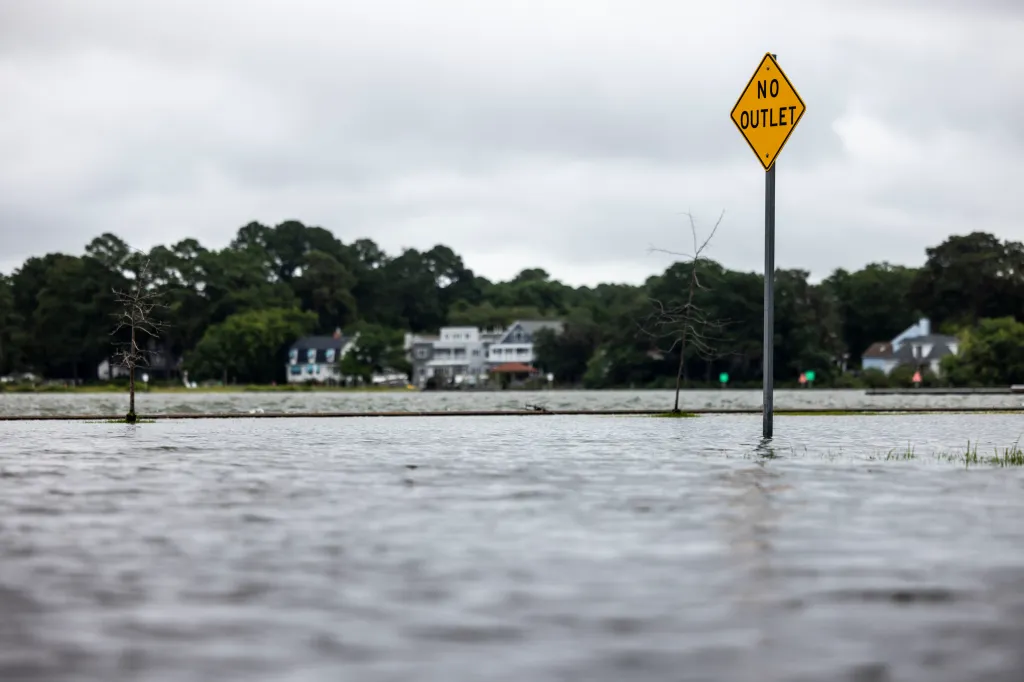
As two tropical systems swirl off the East Coast, Hampton Roads residents should be ready for what may come. We know to have an emergency plan, to pay attention to forecasts and official statements, and to have supplies on hand should either — or, gulp, both — pass through our region.
That’s more important than ever. A federal shutdown looms — with unknown effects — and the Trump administration has already made deep cuts to essential weather and emergency response agencies. That leaves individuals, communities and state officials to take responsibility for public safety and preparedness as these two storms bear down on the coast.
As of Friday, meteorologists were tracking two storm systems off our coast. One, Humberto, was a Category 1 hurricane after strengthening into a tropical storm on Wednesday. They predicted the other would soon organize enough to be designated as Imelda, though it remained a large cluster of showers and thunderstorms as of that afternoon.
The second system was forecasters’ primary cause for concern, as modeling suggested it would strengthen and follow a track that would bring it onshore in the coming days, likely in the Carolinas. The other, though, is similarly worrisome since low-lying coastal areas would struggle to absorb the rain delivered by a 1-2 punch of tropical weather.
It is a cruel irony that these storms are threatening now. Hurricane Helene made landfall in Florida one year ago, bringing torrential rainfall and devastating flash flooding to parts of Georgia, Tennessee, South Carolina, North Carolina and Virginia. The storm was responsible for at least 250 deaths. Many communities, especially those in western North Carolina, continue their painful recovery today.
While forecasting models have improved considerably over the years, storms are notoriously unpredictable. Some long-term tracks predicted that a Hurricane Imelda could proceed inland from the coast, pouring rain on those areas where Helene’s effects still scar the landscape. Others suggest Hampton Roads could receive 7-10 inches of rain in the next week — and residents here know all too well what that would do.
We will know more in the coming days. But, for now, it’s critical that everyone in our region keep a close watch on the weather and prepare for the possibility, if not the likelihood, of severe weather. These may not be powerful storms, but they could pack a wallop all the same.
That begins with developing an emergency plan and checking the Virginia Department of Emergency Management’s website (vaemergency.gov/know-your-zone) for your evacuation zone, just in case. Keep storm supplies on hand: water (budget 1 gallon per person per day, and don’t forget your pets), nonperishable food, a weather radio, flashlights and batteries, candles, First Aid supplies, etc. VDEM (vaemergency.gov/prepare/emergency-kit) has a good list to assist.
Whether or not an evacuation is ordered, moving around the region could be treacherous in the coming days so remember not to walk or drive through floodwaters. Even a small amount of moving water can shove even a heavy vehicle off a street, and floodwater is rife with contaminants so stay well clear of it if possible.
These preparations may seem rote by now, but they are paramount. The federal government will shut down next week without congressional action, and agencies report there are no plans from the White House should that happen. That could affect operations at the National Oceanic and Atmospheric Administration, which is moving to rehire hundreds of National Weather Service staff cut by the so-called Department of Government Efficiency.
And given the ham-fisted response to July flash flooding in Texas, area residents can’t be confident in help coming from the Federal Emergency Management Agency in the aftermath of a disaster. President Donald Trump wants the agency dismantled and, in the meantime, has put unqualified and incapable leaders at its helm, at a tremendous risk to lives and property.
The hope, of course, is that all our preparations will be rendered unnecessary — that these storms may twist away with minimal effects. But the environment is very different now, and readiness is more important than ever.



